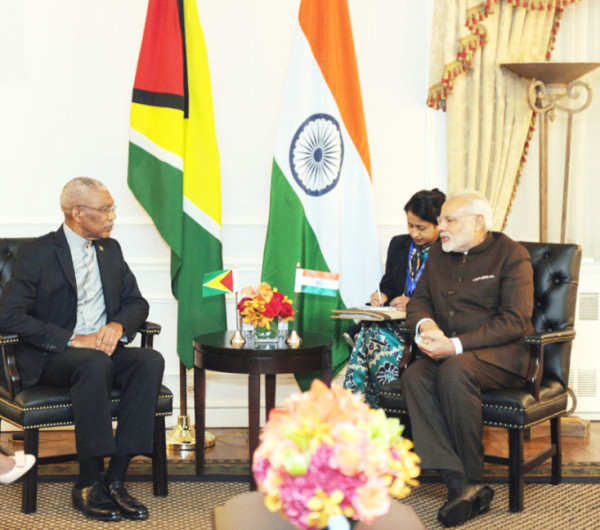President David Granger on Thursday held talks with India’s Prime Minister Narendra Modi as he began the first of a series of bilateral meetings with visiting Heads of Government participating in the 70th United Nations General Assembly in New York.
According to a Ministry of the Presidency statement, Granger told members of the Guyanese press corps afterwards that the ongoing border controversy with Venezuela was discussed with Prime Minister Modi and he also said he was willing to meet with his Venezuelan counterpart President Nicolas Maduro at a meeting being organised by the UN Secretary-General Ban Ki-moon.
The meeting was held at the Waldorf Astoria Hotel, in New York.

“We have very strong bilateral relations with the Republic of India and the meeting with Prime Minister Modi served as a renewal and a recommitment, not only to our long standing friendship and our cordial relations, but also to the specific commitments to agreements entered into over the last 10 years,” Granger was quoted as saying.
He added that while there was no attempt to gain any assurances from India on its position at this time, he will be meeting with Prime Minister Modi again in November in Malta, during the Commonwealth Heads of Government meeting.
Granger noted that over the past week, there has been a gradual buildup of armed forces on Guyana’s western frontier, including the deployment of tanks, missiles and an increase in the number of troops near the Cuyuni River.
“We have alerted the international community and we look to India, particularly as a strong member of the Commonwealth, to give us support and to lead the debate to ensure the security of small states if guaranteed,” he said.
Meanwhile, Granger also said he is willing to meet with Maduro, who has indicated likewise. The meeting is expected to take place on Sunday in New York on the fringes of the UN General Assembly.
Granger added that he will again be putting to the UN Secretary-General that the matter should be taken to the International Court of Justice.
“For our part, we have decided that after 50 years of harassment and provocation, we need to aim at a juridical settlement and we have indicated to the United Nations that we prefer to go to court. So the actual Good Officer process, after several decades, has not borne fruit.
We don’t feel the prolongation of that process will be helpful,” Granger emphasised.
He also reiterated that the Venezuelan claim is not only hampering Guyana’s economic development and exploitation of natural resources, such as petroleum, but it is also becoming aggressive. “It is becoming a serious problem, not only in Guyana on our western frontier and Cuyuni area, but in the Caribbean region,” he added.










